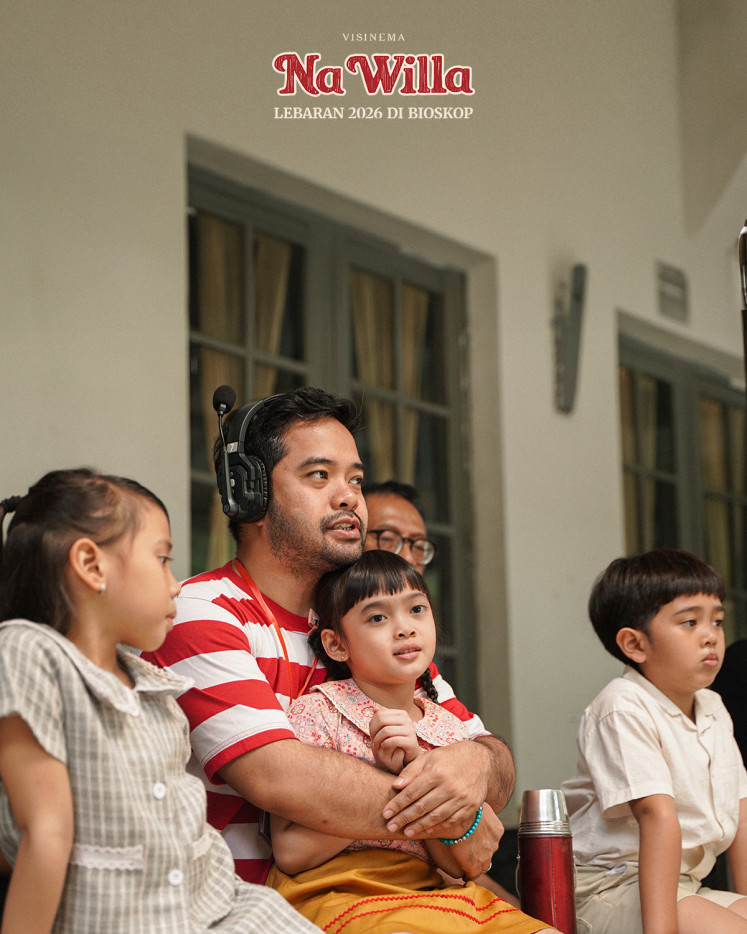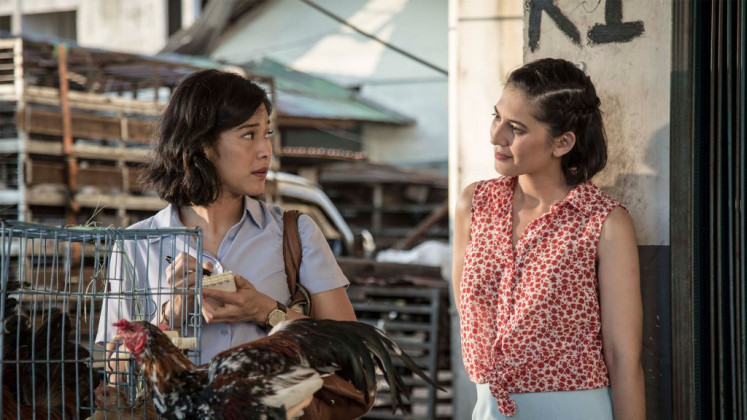Popular Reads
Top Results
Can't find what you're looking for?
View all search resultsPopular Reads
Top Results
Can't find what you're looking for?
View all search resultsHow COVID-19 is affecting Indonesian cinema
Change text size
Gift Premium Articles
to Anyone
As we enter our third month of the pandemic, what does it mean for Indonesian cinema?
It has been nearly two months since the first cases of COVID-19 were detected in Indonesia, and much of the country has been under strict restrictions on movement.
Even as the government has said the curve is flattening in Jakarta, people are still being encouraged to stay home and the Idul Fitri mudik (exodus) has been banned.
The holiday season is usually a time for theatrical releases, but with cinemas shut down across the country, much of the population is at home either glued to their TV screens or streaming their favorite movies.
Last month, numerous new releases by major studios were postponed indefinitely when cinema giants Cinema XXI and CGV shuttered their doors to comply with the government’s advice, and ongoing productions ground to a halt to follow physical distancing guidelines.
In an Instagram Live session initiated by German cultural center Goethe-Institut, Palari Films producer Meiske Taurisia acknowledged that viewer habits had changed massively, noting that streaming had become a substitute for watching movies in theaters.
“For me, that makes me rather anxious because my work revolves around making films. When everyone turns to streaming, will they go out to the movies again as cinemas start to open?” she wondered.
Meiske also wondered was what physical distancing measures would be put in place when cinemas reopened.
Prior to the closures, cinemas required a one-seat gap between viewers, reducing capacity by 50 percent, and also reduced the number of screenings each day.
“Cinemas closed around mid-to-late March. If we were to estimate that three new titles are released on average each week – assuming the pandemic lasts eight to 10 weeks, that would mean around 30 movie releases have had to be postponed indefinitely.”
While a surplus of movie titles would benefit cinema owners, Meiske said it gave her pause for thought.
As for Palari Films, the production house’s current project is the family flick Ali & Ratu-Ratu Queens (Ali & The Queens of Queens). Starring Iqbaal Ramadhan in the lead role as 17-year-old Ali, the film follows his journey to New York to look for his estranged mother after his father’s passing.
While the Lucky Kuswandi-directed film is set to premiere this year, Meiske said their plans had been thrown into disarray by the pandemic, with an end-of-the-year release being the most likely course of action.
“There are many things we do for a new release, one of the major ones being registering the title with the cinemas. We also do promotional activities, which have also stopped,” Meiske said.
“Even though promotional activities don’t seem like much, all the vendors we work with have also been affected. People need cash on hand, and if we can’t pay them because of the delays, that’s also a problem for them.”
At this point, Meiske said those in the industry felt there was nothing they could do and that they would just have to wait in uncertainty. Continuing projects, she said, was rather hard, although films could still be edited remotely, as is the case with Ali & Ratu-Ratu Queens.
“We’re currently thinking about what we can do at Palari once the situation returns to normal, or rather the ‘new normal’. We have upcoming projects like Seperti Dendam, Rindu Harus Dibayar Tuntas (Vengeance Is Mine, All Others Pay Cash), which will enter production, but we have to think about new projects and new stories.”
Currently, the staff at Palari Films are working from home, and using their time to come up with new stories, a process Meiske said had often been delayed and sidelined before.
During the filming of the movie, she said the smallest number of people she worked with on set was five to seven. If physical distancing rules still limited groups to five people, it would make things hard.
“A shoot with five people would mean that the space is rather small, and that would in turn make keeping your distance hard to do. Production is the hardest step to complete with physical distancing measures in place; it can be done but it would be super hard,” she said, adding that she had discussed the issue with several European filmmakers.
As the movie industry also involves behind-the-scenes workers, many have been left out of the job.
According to Meiske, several initiatives have cropped up to help those affected, although they are community-driven rather than state-run. The freelance nature of the job, she continued, made it hard to receive help from state institutions.
Going forward, Meiske noted that over-the-top (OTT) services were a viable method of release, as Palari’s 2018 flick Aruna & Lidahnya (Aruna and Her Palate) was made available on GoJek’s GoPlay service, while Posesif (Possessive) was released on iFlix.
“It’s really a perfect business model in times like these, as everyone has gone online. The question is, ‘is anyone bold enough to do an online premier?’ she said.
Several Western releases have skipped theaters completely and headed straight to streaming, including Disney's Artemis Fowl and romantic comedy The Lovebirds.
“However, the problem is that when we cut a deal with OTT services, there are variables that come into play like exclusivity. We have to look at whether a service has the reach, as the number of players in the field has meant [a customer’s choice of service] is a matter of personal preference.”
The idea of a premiere, she said, was to have the biggest outreach. While she was interested in testing the waters, Meiske did say it would most likely be in the form of a non-exclusive simultaneous premiere across various platforms.













